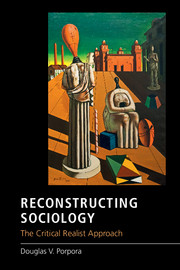Book contents
- Frontmatter
- Dedication
- Contents
- Acknowledgments
- 1 Seven myths of American sociology
- 2 Do realists run regressions?
- 3 What is truth?
- 4 Whatever happened to social structure?
- 5 Are we not men – or, rather, persons?
- 6 What and where is culture?
- 7 Do we need critical realism?
- 8 So what do we do with it?
- Bibliography
- Index
3 - What is truth?
Published online by Cambridge University Press: 05 April 2016
- Frontmatter
- Dedication
- Contents
- Acknowledgments
- 1 Seven myths of American sociology
- 2 Do realists run regressions?
- 3 What is truth?
- 4 Whatever happened to social structure?
- 5 Are we not men – or, rather, persons?
- 6 What and where is culture?
- 7 Do we need critical realism?
- 8 So what do we do with it?
- Bibliography
- Index
Summary
The question posed by this chapter's title was, according to the New Testament, Pontius Pilot's retort to Jesus. Jesus had just declared himself the truth, effectively assigning himself what Roy Bhaskar would call Alethic truth and others Truth (with a big T), the ultimate truth behind “life, the universe, and everything.” Pilot, clearly a proto-postmodernist, was having none of it.
Today, especially with what postmodernists termed the “end of meta-narratives,” many liberal thinkers are hostile to any kind of Truth with a big T, religious or otherwise. They see assertions of such Truth as “totalizing,” as repressive of alternate ways of thinking and seeing. If they countenance at all the concept of truth, they prefer local, shifting truths, truth with a little t. One of my feminist comrades tells me that of course she believes in facts. It is only Truth with a big T she opposes. Others are phobic even to such modest talk of truth. They prefer truth-surrogates like robustness or, better yet, no overt reference to truth at all.
The twentieth century ended with a crisis of truth, and we are still in it. Witness the continued popularity of Jean Baudrillard. There is even an International Journal of Baudrillard Studies. According to Baudrillard, in our era, the possibility of truth has vanished. Baudrillard's argument is essentially a poststructuralist one: The very words we would use to speak of reality merely conjure other words, the whole a self-referential system that fails to make contact with wordless reality as it is in itself. As Jacques Derrida likewise put it, “Il n'y a pas hors-texte.”
Of course, as we already saw in our introduction, there remains the problem of performative contradiction. As speech acts, assertions ineluctably carry with them their own validity claims, among them that what is asserted is true. Severed from that validity claim, any putative assertion becomes unintelligible. Derrida's claim, for example, is meta-textual and so itself beyond its own textual announcement. So it is with Baudrillard. If we are to make any sense of Baudrillard's assertion, we must take him to be asserting it true that in our era, access to reality has passed. But then does not Baudrillard's own assertion imply contact with at least one reality, the possibility of which the assertion denies?
- Type
- Chapter
- Information
- Reconstructing SociologyThe Critical Realist Approach, pp. 65 - 95Publisher: Cambridge University PressPrint publication year: 2015



